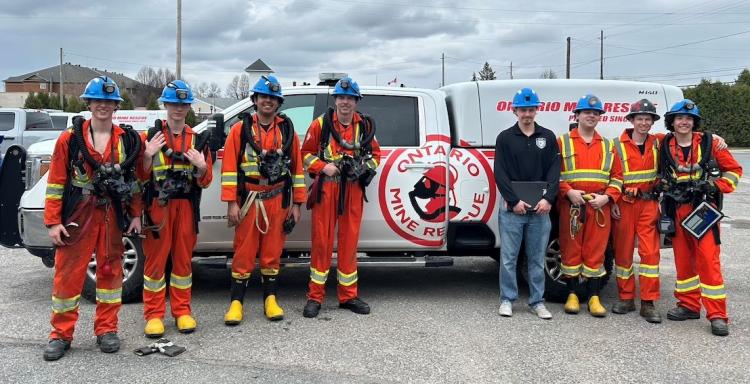Laurentian University will host the 2026 North American University Mine Rescue Competition during Reading Week, February 16-21, 2026. The event will bring nine student teams from across the continent including institutions from Colorado, South Dakota, British Columbia, Alberta and Ontario to Sudbury for a week of hands-on training and head-to-head competition.

Laurentian Mine Rescue Team after the Sudbury/Onaping Ontario Mine Rescue (OMR) District scenario in May of 2025.
"This competition is unique because of where the teams come from and how differently they train," said Félix Gervais, fourth-year Mechanical Engineering student and President of the Laurentian University Mine Rescue Club. "Hard-rock mine rescue in Sudbury looks very different from coal operations in Colorado or open-pit environments in parts of Western Canada. Getting together lets us learn from each other and improve how we respond to emergencies."
Hosted partly on campus and in partnership with Dynamic Earth's underground mine museum, the competition features several legs: a full underground response scenario, a mass-casualty first aid event, and a technician skills challenge. Beyond points and rankings, organizers emphasize knowledge-sharing and exposure to Sudbury's distinctive hard-rock geology and mining methods.
"One Google search tells you why Sudbury is the place to do this," Gervais said. "With deep nickel mines like Creighton and research facilities thousands of feet below surface, it's a mining hub. Bringing students here helps them see what makes Sudbury unique and showcases Laurentian's strength in mining and engineering."
Club alumnus Quinn Roos (B.Eng. Mechanical '24), now a mechatronics Engineer In Training (EIT) with Integrate Consulting, is serving as a competition coordinator/special advisor. Roos has competed internationally three times and says planning requires careful coordination across different standards and practices.
"The hardest part is building a rulebook everyone can work with," Roos said. "Teams do things differently depending on their home environment, so we're designing scenarios and guidelines that are fair, realistic, and widely acceptable."
To ensure Laurentian's team can compete on equal footing, alumni like Roos are developing the detailed scenarios, keeping current student leaders at arm's length from insider information.
Organizers expect roughly 80-100+ participants, including students, coaches, judges and volunteers. While the fundraising target is $30,000-$40,000 to cover venues, catering, a closing banquet, event signage and other essentials, Gervais says in-kind support is just as critical.
"So much of this succeeds because the community lends a hand," he said. "We'll have professionals coaching, judging and training; volunteers acting as casualties in first aid scenarios; and partners lending rescue and first-aid equipment."
The Laurentian University Mine Rescue Club is inviting industry partners and community members to get involved in the upcoming competition by offering their expertise, resources, or sponsorship support.
The club is currently seeking volunteers to assist as coaches, judges, and scenario coordinators, as well as in-kind equipment donations such as decommissioned rope-rescue gear, stretchers, training dummies, and legacy firefighting equipment suitable for practice use. Financial or service-based sponsorships are also welcome to help cover venue, catering, logistics, and recognition materials.
"Even decommissioned equipment is incredibly valuable for training," explained Roos. "We don't use it for live rescue we use it to simulate real-world setups safely."
Founded in 2015, the Laurentian University Mine Rescue Club marked its 10-year milestone last year. After a pandemic-era lull across the circuit, participation has rebounded: the club drew 50+ students at its first meeting this year, with about 30 active members preparing for competition.
"This is the first time Laurentian has hosted the international event," Gervais said. "It's an opportunity to highlight our programs, our students and our city and to reinforce Sudbury's role as a North American mining hub."













